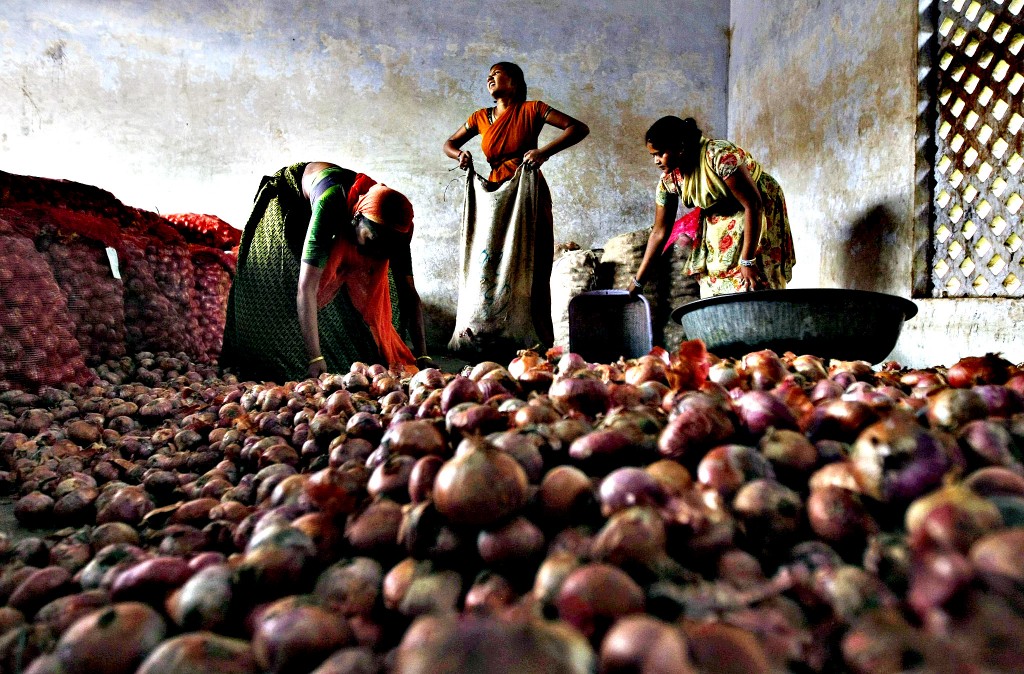by Fabio Parasecoli
I recently spent two weeks in Bangalore, India doing research viagra online 50mg on geographical indications and on the food industry in one of the global IT capitals of the world. More about that in the coming weeks, but when I was there, I could not help but be intrigued by recurring news in the newspapers and on TV about the unexpected surge in the price of onions. The widespread coverage and the heated discussions surrounding the issue prove its enormous relevance in Indian politics.
Due to a bad crop in Maharasthra and excessive rain in Karnataka in southern India, by mid September, onions were sold at 80-82 rupees per kilo (more or less US $0.70 per pound) at the greengrocer’s, while the wholesale price hovered around 60 rupees (about US$ 0.50 per pound). In the past five years, the wholesale price has oscillated between 25 and 45 rupees per kilo, with a sudden peak in 2008 at 55, according to the Times of India. Many outside India would think that onions are not such a fundamental staple that a price increase would cause such a stir. It would be easy to discount the onions as basically cheap and the difference just as a matter of cents.
However, the onion is one of the most prevalent ingredients in many Indian cuisines, especially considering that a considerable segment of the population is vegetarian (although those following sattvic principles — as we will see in a future post — consume neither onion nor garlic). There are reports that some restaurants are slightly changing their dishes in order to make room for the swollen price of the vegetable. And the spike is likely to put a serious dent in their food budget of many poor families, raising fears of inflation.
Opposition parties such as the BJP (the Hindu nationalist Bharatiya Janata Party) are taking stock of the weather vagaries and the unusually abundant rains during the monsoon, but nonetheless they are using this sensitive issue to blame the present government and the Indian National Congress party of corruption and mismanagement. As elections for the lower house of the national parliament will take place in May 2014, the clamor about food prices is much more likely to influence a large part of the citizenry compared to the slowing economy, the falling rupee, and a high current account deficit, which more directly affect the burgeoning middle class.
There are precedents to these debates. In 1980 Indira Gandhi managed to dominate the 1980 elections for the lower house by riding on the discontent among citizens about the soaring prices of, precisely, onions. Some even attribute the 1998 defeat of the BJP in Delhi to a spike in the price of onions. It is a widespread opinion that a government that is not able to control crop prices, especially for the most modest and common foods, should not guide the nation. The argument is even stronger after the passage of a food security bill in September that subsidizes wheat and rice for around 800 million people — a measure spearheaded by the Congress party that many criticized as a ruse to increase its chances of reelection and a nail in the coffin for the rupee.
Whatever the political backlash, the law is an important step towards food justice in a country were many are still hungry or undernourished, in particular the farmers that are suffering from the corporatization of the agricultural sector (especially in terms of seed availability), state control over prices of food crops, and a complex chain of exploitative intermediaries between the farmers and the consumers. In the heated pre-electoral climate, and with food at the center of the economic and social disputes, it was inevitable that the humble but inescapable onion would make her appearance again on the political horizon.
This article first appeared on the Huffington Post.
Fabio Parasecoli is an Associate Professor and Coordinator of Food Studies at the School of Undergraduate Studies for The New School for Public Engagement. He also a Senior Editor of The Inquisitive Eater, and regular contributor to The Huffington Post.


1 Comment
The first sentence of this essay has what I assume is a typo/perhaps autocorrect, perhaps sabotage. Are you really doing research on Viagra?
Otherwise, I am enjoying the site and the writing!